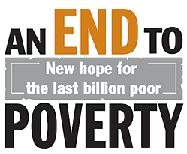
from the March 11, 2008 edition
Why so much aid for the poor has made so little difference
Is poverty cultural or technical? Such debates shouldn't impede progress.
By Mark Lange
San Francisco - Is poverty a problem of policy or destiny? Experts tend to pull in one of two directions. Some focus on the social fundamentals for prosperity. Others, on the technical and financial requirements for sustainable growth.
It's cultural.
In this view, policy is beside the point. Harvard political scientist Robert Putnam says that "social capital" – how closely people in a community are connected – supports the basis for trust essential to commerce. Economist Gregory Clark of the University of California argues that prosperous societies grow their economies through Industrial Revolution values such as patience, hard work, innovation, and education. Some cultures support such values, some don't, and they certainly can't be imported or master-planned. Implication: Some poverty is permanent.
It's technical.
Others say the developed world has the policy tools poor countries need and the obligation to show them how to use them. While specific proposals vary, development economists such as Paul Collier, Jeffrey Sachs, and Joseph Stiglitz argue that wealthy nations know how to create the conditions for accountable governance, open markets, capital formation, low taxes, reliable institutions, and regulatory frameworks with courts to enforce them. Implication: The right combination of solutions is (almost) within reach.
Whichever side of this debate you're drawn to, it is clear that decades of effort and at least $2 trillion spent by rich countries since 1945 to bring development "to" the world's poorest have delivered, at best, mixed results. A World Bank study by Craig Burnside and David Dollar found a positive impact in countries with good fiscal, monetary, and trade policies. Later analysis by William Easterly, and Raghuram Rajan at the International Monetary Fund, indicates zero impact from Western aid on growth in poor nations – with or without sound policies. Possibly these countries would have done worse without aid. Certainly, we can do better.
The first place to push – for both cultural and technical reinvention – is not in the poor nations' ethics or economies, but in the developed world's institutions. The West's efforts to help the last billion still resound with echoes of the Marshall Plan, a top-down approach that worked wonders after World War II in educated, formerly wealthy societies, where centralized planning and imported capital made the critical difference. This approach is ineffective now – not to mention damaging to the morale of committed people in these troubled countries.
Aid institutions too often pursue disconnected agendas. For every development success story, there's another about exporting plans and resources irrelevant to needs. Excelling at raising money, uncertain about results. Struggling to coordinate 21 US agencies and 50 operating units that deliver aid. Subsidizing (through clenched teeth) shameless kleptocracies and grotesque dictators. Funding fiascoes, such as $5 billion spent since 1979 on Nigeria's Ajaokuta steel mill, which has yet to produce any steel.
Page 1 2 Next Page

